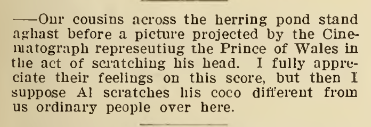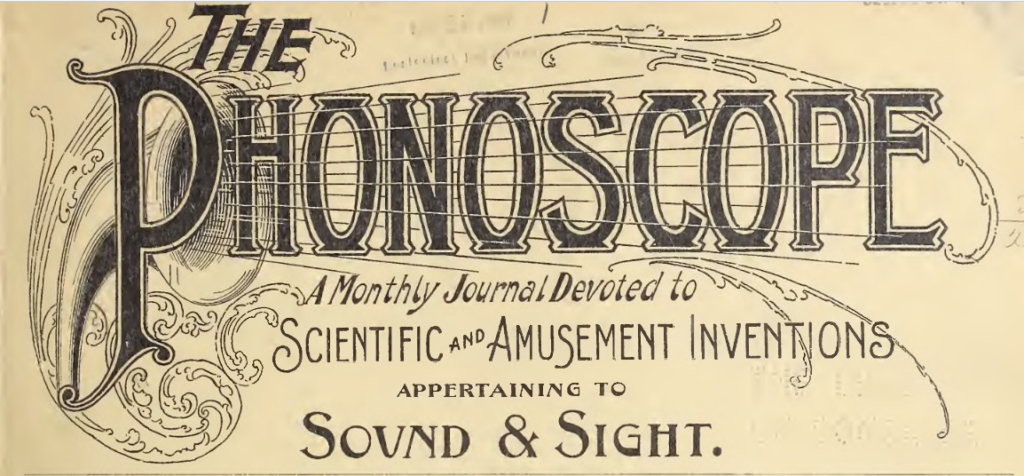
“A Monthly Journal Devoted to Scientific & Amusement Inventions appertaining to Sound & Sight.”
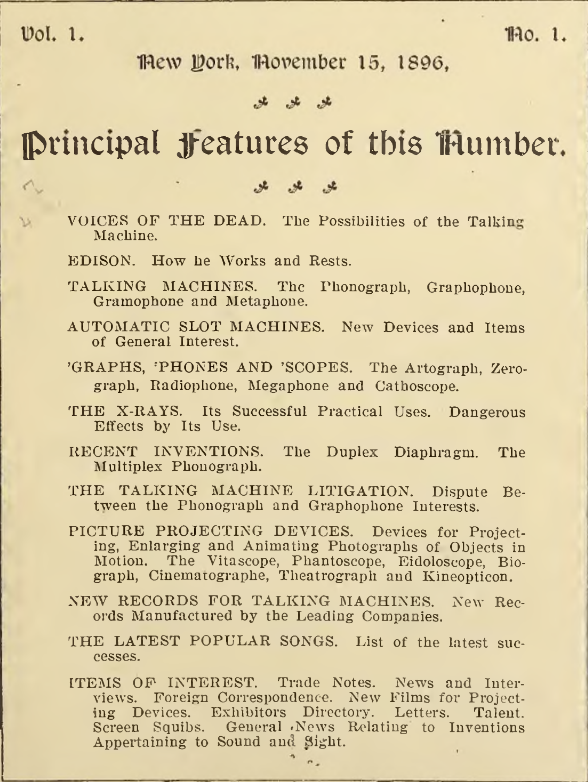
As ever, many thanks to the unsleeping scanner of World Radio History for this gem. We’ll get to the charts of the era eventually, but not before some unspeakable horrors and duplicity.

I bought a teenage.engineering Record Factory that allows someone to cut their own discs last year for €149 just for comparision.
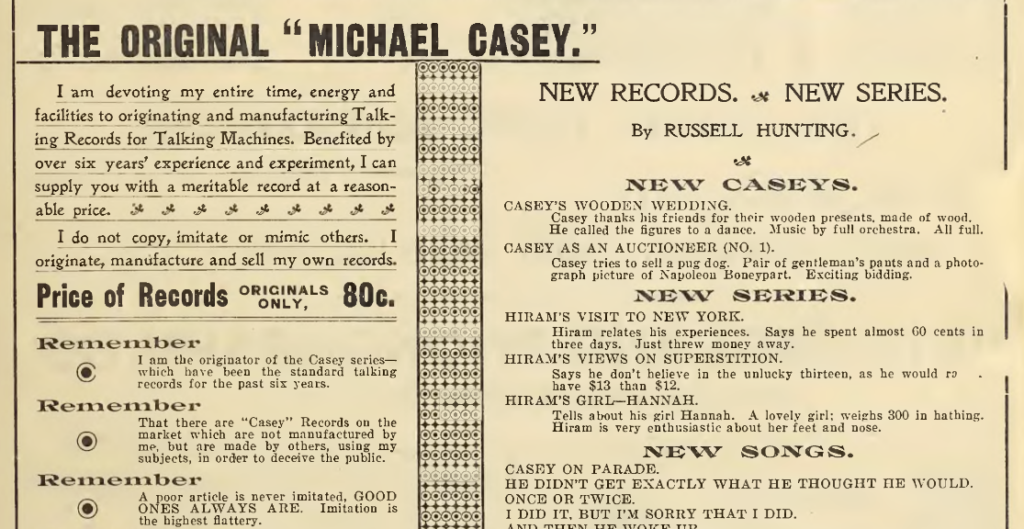
Michael Casey was a character performed by Russell Hunting, after a few sketches in 1892, the character would be used in a serendipitously nominative fashion for a recital of Casey At The Bat, an ode to Baseball. This can be heard on a transfer from Cylinder at the UCSB Cylinder Audio Archive, along with a couple of other transfers featuring the character. The Hiram sketches listed for purchase don’t seem to have survived, but given the descriptions I am assuming they’re not really a great loss.
Russell Hunting was the founder of this magazine, so features prominently. He was arrested and imprisoned on indecency charges pertaining to recordings made for Saloons & Amusement Arcades. Some of this work is collected on the Archephone Records compilation Actionable Offenses. I’ve embedded the Russell Hunting scat skit – Did He Charge Too Much? below.

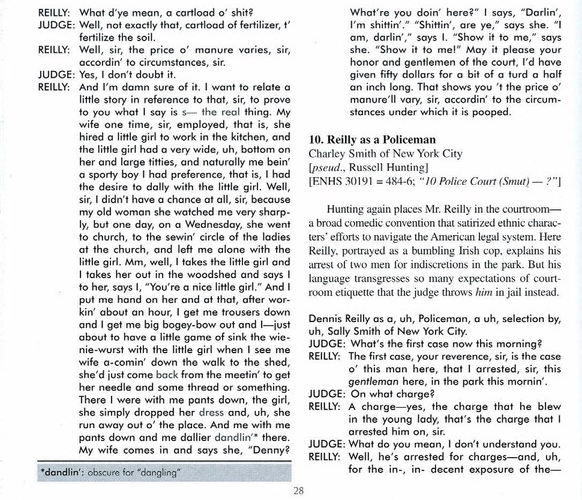
Images are courtesy of discogs.
Right, let’s liven it up a little. Voices of the Dead! I am assuming this editorial is by Russell Hunting, but cannot find a credit.
“Everything on earth serves two purposes: a present and a future one. The deed of the hero
and the saying of the wise man besides benefitting their immediate contemporaries serve as
examples and guides to the succeeding generations.
From time immemorial, therefore, the deeds and learning of the illustrious men and women of the world, have been recorded on stone, vellum, and papyrus, in manuscripts and books.
These records have always been held in the highest esteem and veneration. Even amongst the lowest types of the human race we find some sort of record of their travels and their heroes. The celebrated libraries of Egypt, Greece, and Italy, attest the importance attributed by the ancient people of these countries to the preservation of the records of their thoughts and deeds; while to-day there is hardly a village, be it ever so humble, that boasts not its library and annals. The foremost amongst the public buildings of our great cities are the libraries—the storing place of the thoughts and the record of the deeds of our race.
Yet, at best, these records give but a poor reflection of the times and deeds they are intended to perpetuate. Like preserved fruit, however delicious, they lack the bloom of life: they are dry and difficult of digestion. We read in them in a third-hand fashion. The historian with all his personalities, the growth of the language, the monotony of the reading, all combine to cast about these records, a mist of uncertainty and doubt, which it requires assiduous work and study to dispel.
Recently the writer had occasion to attend a phonograph recital. Among the cylinders used that night there were some whereon Hon. W. E. Gladstone and the venerable Bismarck had recorded their voices. I have always been an ardent admirer of these great statesmen, both shoulders above all their contemporaries, but, as my means and leisure do not permit of my leaving home, my conception of them had been derived mainly from newspaper reports—the echo of the world, alas! so frequently twisted and tainted to suit the audience.
Thus I have read the speeches of Gladstone and of Bismarck, and become familiar with their respective work, but I did not know their spirit until I heard their voice on the cylinder of a phonograph. The body, the strength, the soft modulation, the emphasis, so faithfully reproduced by this delicate mechanism, the life thus imparted to the words, made them sink indelibly into my soul, showing to me in the fulness of their power, the men whom till then I had known only vaguely. I felt their presence; their spirit pervaded me; I understood the secret of their greatness, as the subtle persuasiveness of their voice held me spellbound. If thus we could but listen to the voice of the great founders of this mighty commonwealth: Washington, Jefferson, Jackson, Lincoln and others, how easy it would be for us to grasp their great ideas and teachings and follow in their footsteps. But in their time the talking machines had not been thought of. To-day we are in a position to reap the full benefit of the genius of our great inventors.
How salutary and consoling it is for loving children and friends to be able to retain the voices of their dear departed ones for communion in time of trouble, and of pleasure. The voice of that mother whose every thought has been for our welfare, whose last prayer was to call blessings down on us from Heaven; of that father whose stern, unbending, yet loving character first instructed us in the hard realities of life. Death cannot now deprive us of their help, advice and encouragement, if we will but record their voices whilst they live, and treasure them not only in our hearts, but in a certain and lasting form, on the surfaces of phonograph and graphophone cylinders.
It is by the voice that men communicate with each other in all the fulness of their individuality. The voice, formerly invisible and irretrievably lost as soon as uttered, can now be caught in its passage and preserved practically for ever.
The great speakers, singers, actors of to-day have it in their power to transmit to posterity all the excellencies they are so richly endowed with. Art in its perfection need no longer be lost to succeeding generations, who now shall be able to enjoy all its benefits by setting in motion the wheels of a simple machine.
In future there need be no disputed readings, no doubtful interpretation of text or delivery. The phonographic record, being absolutely true, avoids both by preserving all utterances with every modulation and inflection of voice.
Death has lost some of its sting since we are able to forever retain the voices of the dead.”
Next up is “How I Work” by one Thomas Edison, for that I invite the reader to check this out for themselves.

“Nothing is richer in startling surprises than the business connected with the phonograph and graphophone. Having occasion once to pay a visit to a phonograph company in Louisville, Ky., I came across an extraordinary case of innocence or stupidity. I could not believe my senses, when I found the young man in charge of the office coolly breathing on some phonograph cylinders, and rubbing them with his coat sleeve. He assured me unabashed that this was the only way to “clean” cylinders that had become dirty in the slot machines. No wonder the public complained about dull sounds and indistinct reproductions.
It is a source of regret to note the hundreds of cylinders that are ruined through the possessor’s inability or thoughtlessness to keep them in good condition. The phonograph or graphophone cylinder is a peculiar article, inasmuch
as it is susceptive of the minutest cut by the recording stylus, yet strong enough to resist almost any degree of temperature and to withstand a great amount of rough usage. But some exhibitors, whom the public are supposed to look to for the best results, considerably injure the reputation of the instrument by publicly reproducing records that they have exposed to dirt and dust, which causes them to give very poor results, which are generally attributed to the machine and never to the operator. This is not just, keep your records in good condition and educate the public up to the possibilities of the machine rather than disappoint them through want of care, attention and precaution.
How is this to be done? Keep your records in good condition, and when they wear out, as they will in time, replace them with new ones.
Keep your records in air-tight boxes of tin or wood, and when not in use be sure to keep them covered. If possible, do not reproduce your records in the open air. Keep your repro ducing point clean by wiping it occasionally with a bit of cotton dipped in alcohol. Do not keep your records wrapped up; anything constantly resting against the surface of a cylinder injures it. Always brush your record carefully before reproducing it, but do not use a brush, as brushes, no matter how fine, leave an impression on the wax, which eventually develops into a roughness that is distinctly audible in the reproduction.
The best way to brush a cylinder Is to use a piece of sheet-cotton wadding, which has been previously split to expose the soft side and then frayed at one end In the form of a brush. Always brush your cylinders at right angles (the same way as the impression runs), and do not brush cylinders length ways.
Never touch your records on the outside surface under any circumstances with anything other than the soft cotton mentioned above.
The most important point in keeping your records in good condition is to know when they are worn out and to use judgment in not attributing the poor reproduction of an old record to your diaphragm or machine.”
*To be fair, this advice is still relevant and accurate 127 years later.
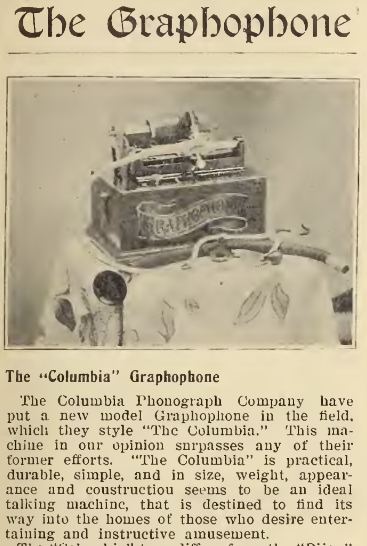

So what’s new in the world of machines?
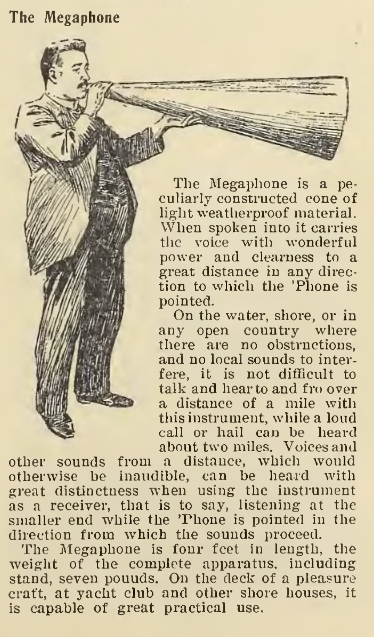
Among the Artograph, Radiophone, Zerograph & Cathoscope descriptions as new discoveries is this complete fantasy.
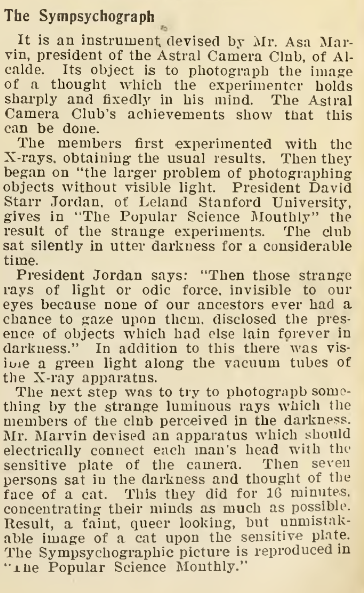
Astral Camera Club, indeed. The article referenced can be found here, with the image. Which is unsurprisingly that of a cat, leading the way for the Internet many years before. And in that article is one passage of some stretched incredulity:
“Prof. Rogers in a matter-of-fact way looked for a few minutes at a postage stamp, then retired to a dark room, and gazed through the lens of the camera at the sensitive plate. The figure of the postage stamp was on his mind, and from his mind it passed out through the sensitive ether to the plate made ready to receive it. The result was a photograph of the stamp—small and a little blurred, but showing the undoubted features of the gracious Queen and the words ‘one penny’. Thus was the bridge between psychic power and photographic sensitiveness made once for all. This connection established, there is naturally no limit to the application of the principle.”


And in other news; porn, fraud, spyware and machines taking our jobs quickly invented.
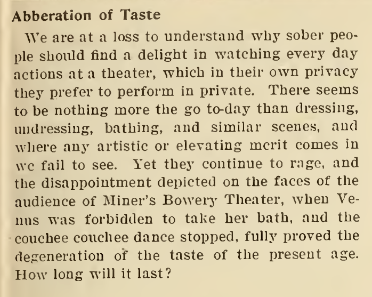
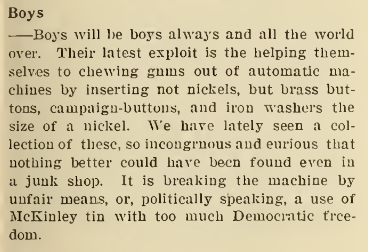

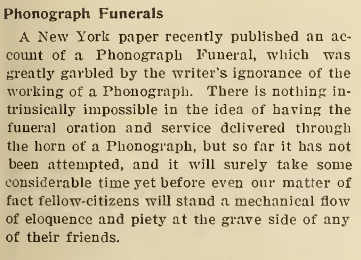
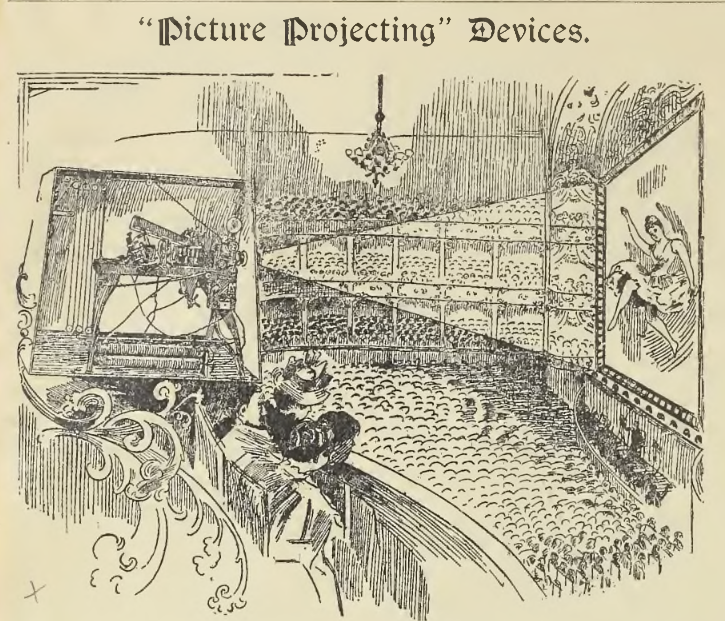
Including the Vitascope, the Cinematograph, the Phantoscope, the Theatrograph, the Biograph and Edison’s Eidoloscope, which I believe was the precursor to modern cinema.
On now to Slot Machines.



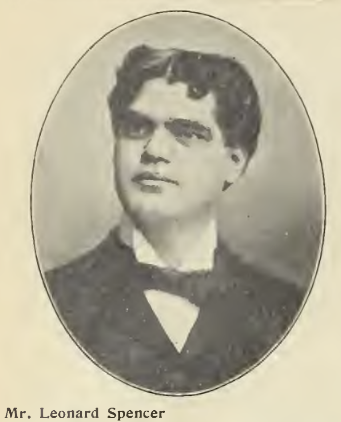
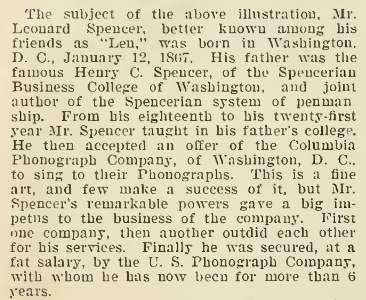

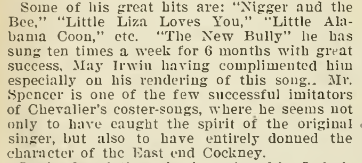
The Darky Shout. Good grief. Of course Whitey invented it.


I have no idea what the supposed illusion is, will probably need to dig through later copies to find out.
Anyway, on to the charts!
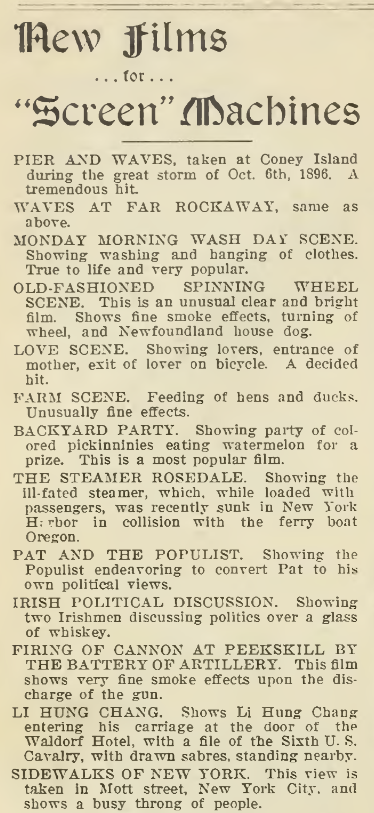
New Films for Screen Machines. Featuring hits such as Backyard Party (colored pickinninies eating watermelon), the Steamer Rosedale (hope I’m reading this wrong and it’s not footage of it sinking with people on it), Love Scene, Farm Scene (not the same movie) and two irishmen discussing politics over a glass of whiskey.
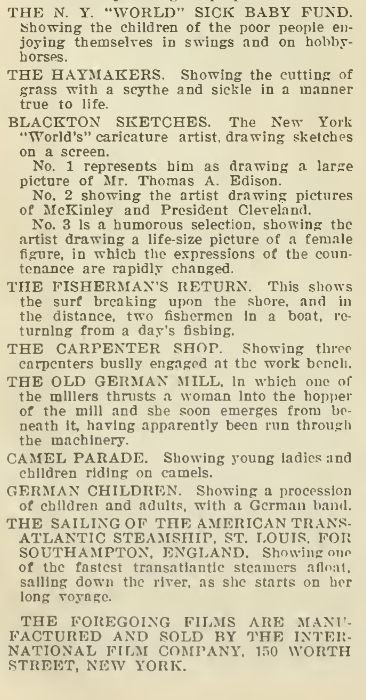
“The Children of Poor People.”
Blackton’s first sketch described therein appears to be here:

Lert’s see what’s in the 1896 hitparade.

Au Revoir Sweetheart – Trevalyn
A Picture of My Best Girl – Moreland
A Dream of My Boyhood Days – Dresser
Bright Happy Days – Walker
Dreams of My Own Land – Dean
Don’t Tell Her That You Love Her – Dresser
Don’t Forget My Boy, you’re leaving home – Wheeler
Don’t give Up the Old Love for the New – Thornton
Down In Tornale Town – Amands
First Love, Dearest Love – Penn
Going for a Pardon – Thornton
His Last Thoughts Were of You – Marks & Stern
In the Baggage Coach Ahead – Davis
I’ll Be Home To – morrow Night – Howard
In the Language of the Flowers – Coburn
I Love You, Dear – Stromberg
Just Another Girl Who Left a Happy Home – Petrie
Johnnie – G Evans
Kiss Me Good – night, Mother – Moran
Kathleen – Mora
Love Makes the World go Round
Love I Adore You – Cooper & Osborne
Love’s Souvnier – Feist
Let me Call You my Sweetheart Again – Thornton
My Dad’s Old Violin – Golden
My Gert – Golden & Ontcanlt
Mother Was a Lady – Marks & Stern
No one Ever Loved You More Than I – Marks & Stem
On Sunday – Flynn
Polly – Blandford & Chase
Pebbles on the Beach – Mann & Starr
Serenade – Smith
Summer Girl of Brighton Beach – Rogers
Sue’s a Stranger to Him Now – Campbell
Streets of a City Grand – Gillesnie
Sunday Night In Lover’s Lane lFord & Bratton
She’s been a Mother to me – Ford & Bratton
She Might Flirt With Others, Still She Loves but me – Marion
Those Lost Happy Days – Feist
Two Heads are Better Than one – Goodwin & Morse
They All Love Maggie Grady – Slafer
The Teacher and the Boy – Marks & Stern
Tell Her That we Love Her Just the Same – Petrie
The Belle of Hogan’s Alley Bernard & Blake
The Sweetheart I Left at Home – Braisted
The Desert Way – Braisted
Whisper Yonr Mother’s Name – Braisted & Carter
When it is Love at First Sight – Mock
When “he Girl you Love is Many Miles
Away – Cohan & Koepen
Wont’ Somebody Give me a Kass? – Smith
You’re so Good, Daddy – Starr
Yon’ll be Sorry When I’m Gone – Rosenfeld
You, Only You – Keene
I’ve removed the Publishers, which were numbers with a key at bottom of the page. It shows a number in the middle of the text, which is kind of confusing.

As They Did in Days of Yore – House & Seevers
And Then he Woke up – Johnson
Appearances Were Against Her – Stromberg
Bold Pierre – Smith & Englander
Cod Fish Ball – J. & H. Dillon
Come Play With Me – Hawtrey & Plumpton
Down to Coney Isle – Gilmore & Leonard
Finigan’s Fancy Ball – Gilmore & Leonard
Games we Used to Play – Marks & Stern
Handicap Vocal – D. Reed, jr.
Honeymoon Vocal – D. Reed. jr.
Hugh McCue – Cohan
I am so Different From the Rest – H. W. Petrie
I’ll Tell my Big Brother on You – Edgar Selden
If I Were Really a King – Smith & Englander
Johnnie Took the one I Wanted – J. A H. Dillon
Isabelle (a Girl who is one of the Boys) – Ford & Bratton
Mary Black From Hackensack – Lew Doks’ader
Moonlight on the River – Golden & Dolen
Oriental Echoes Vocal – Reed
Oh! Aunt Jane – Petrie
Oothcey Koochey – Goodwin & Morse
Parlor Sofa Politics – McLaughlin
Pebbles on the Beach – Starr & Mann
Rootle Tootie – Golden
Singing in a Trolley Car – Fuchsins
The Real Thing, March Song – Petrie
The Day the Farmer Came to See the Town – Keen
That’s What—By Gosh – Parker
There are Things That Cannot be Explained – Horwitz & Bowers
When it’s a Boy – Goodwin & Morse
You’re all Right, But You Won’t Do – Goodwin & Morse
Hmm, none of these sound particularly amusing, but it was 1896 I guess. What else is there?

Grace O’More – Witt
I Will be Your Sweetheart – Cohan
I Love my Girl – Rosey & Reed
My Young Man – Stromberg
On the Benches in the Park – Thornton
She’s the Sweetest Little Girl In Town – Trevelyan
She’s the Comfort of Their Home – Rogers
Sweet Rosie O’Grady – Nugent

All Over Town
Booze, Glorious Booze – Deane
Boys. She’s a Dream – Dillon A Levi
By a Brook Sat a Lady – D. Reed. jr.
Caprice, a great character song – Marks
I’m Saving up to Buy a Home for Mother – Cohan
Like a Good Little Girl Should do – Ford A Bratton
Modern Century Girl – Packford
Old Jim’s Christmas Hymn – Gray
Send me a Picture of the Old Home – Arnold
Would You Ask – Smith
When the Light Is Turned Away Down Low – Spanldlng (sic)
I can only imagine what Booze, Glorious Booze was.

Uh-oh.
Ain’t I Your Honeyboy no More? – Davis
Black Four Hundred Ball – Johnson & Cole
Dere’s a Bully Gone to Rest – Dryden & Mitchell
De Bully’s Weddin’ Night – Carleton & Cavanagh
Dead Swell Colored Lady – Burke
Dancing With the Girl You Love – Schackford
Eighth Battalion on Parade – Williams & Hogan
I’m Lonely Since My Baby’s Gone – Emmersou
I’se Your Nigger if You Wants Me, Liza Jane – Dresser
Looking for a Bully – Howard
Loniser – Francis
My Gal Is a High Born Lady – Fagan
Raccoon and the Bee – Abeles
That’ll be all Right, Baby – Cook
When Miss Maria Johnson Marries Me – Williams & Walker
Yer Baby’s a Comin’ to Town – Kelly
